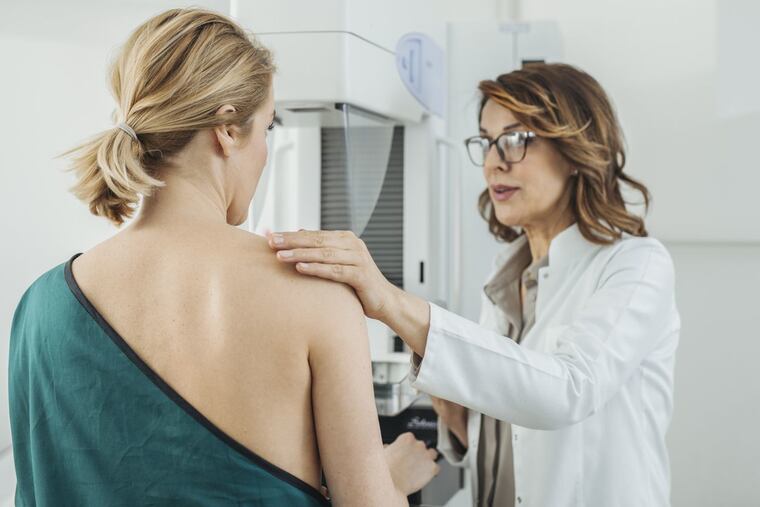Cancer among younger Americans is on the rise, new study shows
Some of the biggest increases were seen in women and in younger people diagnosed with gastrointestinal and breast cancers.

Most cancers in the United States are found in people age 65 and older, but a new study shows a concerning trend: Cancer among younger Americans, particularly women, is on the rise, with gastrointestinal, endocrine and breast cancers climbing at the fastest rates.
A study published Wednesday in JAMA Network Open showed that while cancers among older adults have declined, cancers among people younger than 50 have increased slightly overall, with the largest increases among those age 30 to 39.
"This is a population that has had less focus in cancer research and their numbers are getting bigger, so it's important to do more research to understand why this is happening," said Paul Oberstein, director of the Gastrointestinal Medical Oncology Program at NYU Langone's Perlmutter Cancer Center, who was not involved in the study.
» READ MORE: Colorectal cancer screening among young adults is increasingly important as cases rise
If some younger people have an increased risk of cancer, as they age, the concern is that their cancer risk may propagate, Oberstein said. "If we don't understand what's causing this risk and we can't do something to change it, we're afraid that as time goes on, it's going to become a bigger and bigger challenge."
There is not a clear explanation why cancer is rising among younger people, but experts say there are several possible reasons behind the trend, including rising obesity rates and lifestyle factors such as drinking alcohol, smoking, poor sleep and being sedentary. Environmental factors, including exposure to pollutants and carcinogenic chemicals, also likely play a role.
The researchers analyzed data from more than 560,000 patients in the United States diagnosed between 2010 and 2019 with early-onset cancer — defined as cancers that affected people younger than 50.
They found that, overall, early-onset cancer diagnoses rose by nearly 1% during the study period to 56,468 patients, up from 56,051 patients in 2010. The trend was most pronounced in the 30 to 39 age group, with cases increasing about 19 percent.
Early-onset breast and other cancers
There were significant increases in certain types of cancer. Breast cancer, for instance, accounted for the highest number of cancer cases in younger people, and increased about 8 percent over the 10-year period, said Daniel Huang, assistant professor at the National University of Singapore and a transplant hepatologist at the National University Hospital, who is the senior author of the study.
Gastrointestinal cancers, including the colon, appendix and bile duct, were fewer in number but increased about 15% during that time — making it the fastest-growing type of cancer among younger people, he said.
The differences between men and women were striking. The number of early-onset cancers in women increased by 4.4% during the study period; among men the number declined by nearly 5%. The increases seen among younger women were likely driven by the rise in cancers of the breast and uterus.
» READ MORE: What is Lynch syndrome, the genetic condition related to colon cancer? | Five Questions
Although the total numbers were small, the biggest increases in cancer among younger people by race were seen in Asian or Pacific Islanders (32%) and Hispanic patients (28%). Cases among younger Black patients slightly declined, falling by about 5%. It’s not clear if the decline is meaningful or if cases are underdiagnosed.
Overall, younger people diagnosed with cancer still represent a relatively small portion of overall cancer cases, but the increases are nonetheless concerning.
"It's an important trend, especially important if it continues, but it is a small part of what's going on in oncology," said Otis Brawley, an oncologist at the Sidney Kimmel Comprehensive Cancer Center at Johns Hopkins.
The study did not examine cancer stages, so it's unclear from the data whether the early-onset cancers developed earlier or were simply being diagnosed earlier in the course of the disease, experts explained.
Identifying risk factors for young cancer
Most cancer risk factors are based on studies of predominantly older adults, but studies are being designed to help understand how certain exposures in earlier life may impact cancer risk in later life, said Hyuna Sung, senior principal scientist and cancer epidemiologist at the American Cancer Society.
Studies such as the one in JAMA, she said, "motivate new studies to help identify risk factors that may be able to explain these trends."
Other research has shown a trend toward younger diagnosis in colorectal cancer. One in five new cases of colorectal cancer in the United States occur in people younger than 55 — a rate that has about doubled over the past three decades, according to a concerning recent report from the American Cancer Society.
In 2018, the American Cancer Society updated its colorectal cancer screening guidelines, lowering the age to start screening for those at average risk from age 50 to 45.
Experts say trends such as those seen in the new study should be closely monitored as they may influence other screening recommendations, including those for breast cancer.
"As we continue to do better at identifying people who are at higher risk at younger ages, we really need to adjust our screening practices as well," said Jennifer Litton, a breast medical oncologist at the University of Texas MD Anderson Cancer Center.
An estimated 1.9 million new cancer cases are diagnosed each year in the United States. In some cases, there are no screening tests for certain cancers, and when there are, the tests are often not recommended for young people who are at average risk.
One of the most important things people can do to minimize their risk, Brawley said, is to manage body weight, exercise, limit alcohol consumption and avoid smoking.